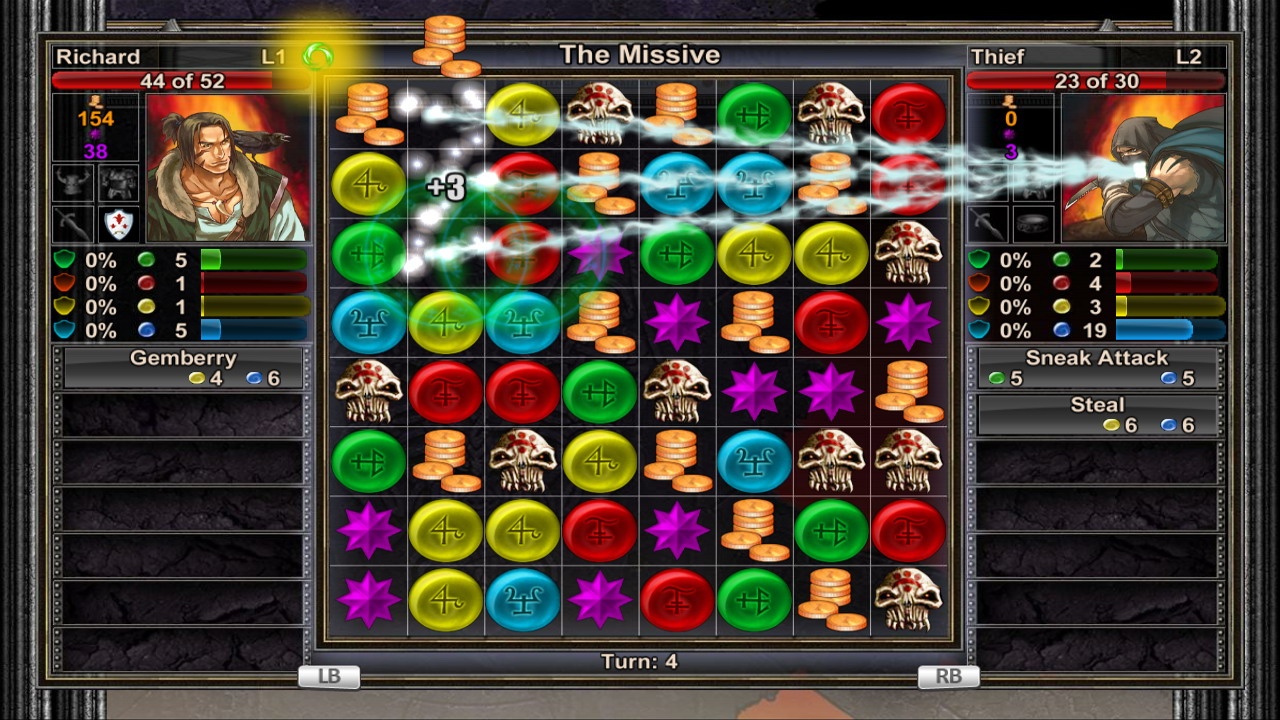Originally released earlier this year on the PlayStation Portable and Nintendo DS, Puzzle Quest was a revelation. By taking some of the most compelling properties of role-playing and puzzle games, Infinite Interactive created something that was more than the sum of its parts. It's both an RPG that can be played in short bursts, as well as a puzzle game that begs to be played in long stretches. Puzzle Quest is now available on Xbox Live Arcade, and in addition to enhancing the graphics to look sharp on a big HDTV, online play has been added to the mix, making the competitive multiplayer that much more accessible. For 1200 points ($15), you're getting a superior version of a really great game.

At the start it seems like RPG business as usual. There's a nicely painted overworld map dotted with castles, villages, and enemy strongholds that you'll travel about, taking on quests and fighting the random monsters that block your path from one location to the next. You'll get new weapons, armor, equipment, and spells; new characters will join your party; and once you establish your own personal citadel, you'll be able to capture creatures and use them as mounts, craft new items out of special runes found out in the world, and eventually lay siege on opposing cities.
What makes Puzzle Quest so interesting is how it uses a familiar puzzle game format to perform these actions. The gameplay is most analogous to Bejeweled. If Puzzle Quest were just Bejeweled, it would probably get tedious quickly, but by applying several standard RPG combat conventions to the formula, it becomes something much more strategic. Standard, one-on-one combat is the most common game you'll play, and it's also the deepest. You and your opponent, each using the same board, will take turns moving pieces, trying to whittle down each other's reserve of hit points. Attacks are performed by lining up skull-shaped pieces, though you've also got several spells that you can use for both offensive and defensive purposes. The spells you'll start off with, as well as the spells you'll earn as you gain experience levels, are largely dictated by which profession you choose at the start of the game.
Spells can require up to four different types of color-coded mana to use, and you charge up your mana reserves by clearing out red, blue, yellow, and green pieces from the board. The back-and-forth dynamic demands that you think several steps ahead any time you move a piece, since you want to avoid setting up your opponent with favorable piece positions at the end of your turn. In addition to the mana and skull pieces, there are gold coins and purple experience-point pieces that can earn you extra postgame bonuses, as well as wild-card multipliers, which can make the mana pieces you clear worth much more.
Setting up rows or columns of four or five pieces is critical during combat as it gives you an extra turn, and any time you can buy is useful. Even just a few hours into the game, the enemies you'll face in Puzzle Quest can be downright merciless, and there are times when it seems as though the computer is stacking the odds in its own favor. Still, even when you lose a fight, you earn a small amount of coin and XP, and the only punishment is that you have to fight that enemy over again. Other tasks, such as training a mount, learning a spell, and crafting items all require you to play through modified versions of the standard combat gameplay that change the rules slightly, but scratch a similar itch.
When you gain enough XP to level, you're given points that you can distribute between seven character attributes, which, along with your gear, mount, party members, and spells, can have a profound effect on how Puzzle Quest plays, and it helps keep the gameplay fresh. Even if you stick strictly to the main quest, ignoring the numerous side quests, item crafting, sieging of towns, or numerous other activities you can get into, Puzzle Quest is truly epic in size.
For those who've already sunk their hours into either the PSP or DS versions of Puzzle Quest, you might notice some changes in the XBLA version--some subtle, some not. The graphics look about as they did on the PSP, though all of the great 2D art has been upscaled. It looks better than ever, though we did find ourselves squinting at the overworld map on a few occasions and wishing there were a zoom feature. Playing Puzzle Quest on a big screen has some functional benefit as well. We found it easier to identify patterns, and the distinct rune patterns on the mana pieces can make them easier to identify for colorblind players.

Online play is a great addition, even if it's limited to straightforward ranked and player matches. It's still fun to be able to take the character you've been building up in the single-player campaign against another live player, and the ability to adjust the time limit for each player's turn can make the action much more frantic and challenging. Developer Infinite Interactive has also implemented a few balance changes and bug fixes. Certain spells now have cooldown timers, and the companion bug from the PSP version has been addressed, among other things. In our experience with the game, the changes were noticeable, but their effect on the gameplay wasn't overt.
The appeal of Puzzle Quest for fans of either RPGs or puzzle games is quite obvious, but what's most remarkable about Puzzle Quest is how a simple change of context turns some tired genre conventions into something suitable for just about anyone, regardless of your interest in the components. Despite coming out on XBLA a good half a year after the original DS and PSP releases, Puzzle Quest still feels incredibly fresh and vital, and the changes made in between make it even easier to recommend.